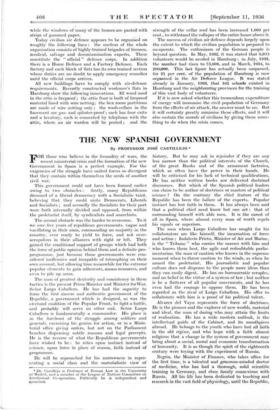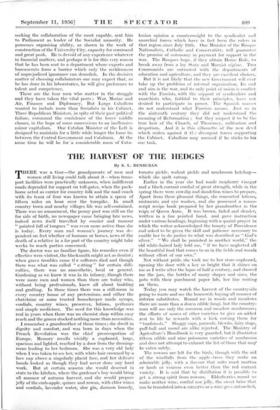THE NEW SPANISH GOVERNMENT
By PROFESSOR JOSE CASTILLEJO • FOR those who believe in the fecundity of wars, the recent ministerial crisis and the formation of the new Government in Spain is a perfect example. For the exigencies of the struggle have united forces so divergent that they contain within themselves the seeds of another civil war.
This government could not have been formed earlier owing to two obstacles : firstly, many Republicans dreamed of a liberal democracy with a Socialistic taint, believing that they could unite Democrats, Liberals and Socialists ; and secondly the Socialists for their part were both internally divided and opposed, from within the proletariat itself, by syndicalists and anarchists.
The second obstacle was the harder to overcome. To it we owe five years of republican governments, vague and vacillating in their aims, commanding no majority in the country, ever ready, to yield to force; and not over- scrupulous in their alliances with right or left. They gained the conditional support of groups which had both the force ofpublic opinion behind them and a definite pro- programme, just because those governments were con- sidered inoffensive and incapable of ,triumphing on their own account, but allowing time meanwhile for the extreme popular elements to gain adherents, amass resources, and even to pile, up arms: The man of greatest dexterity and consistency in these tactics is the present Prime Minister and Minister for War, Senor Largo Caballero. He has had the sagacity to form the first sincere and authentic government of the Republic, a government which is designed, as was the electoral coalition of the Popular Front, to fight a battle, and probably will serve no other end. Senor Largo Caballero is fundamentally a commander. His place is in the forefront of the struggle among soldiers and generals, exercising his genius for action, or in a Minis- terial office giving orders, but not on the Parliament benches dispensing subtle reasons . and legal precepts. He is the reverse of what the Republican governments have wished to be : he relies upon instinct instead of science, upon force in place of reason, faith instead of programme.
He will be reproached for his narrowness in repre- senting a social class and the materialistic view . of • Dr. Castillejo is Professor of Roman Law in the -University of Madrid, and a member of the League of Nations Committee on Intellectual Co-operation. Politically he is independent and detached. history. But he may ask in rejoinder if they are any less narrow than the political interests of the Church, of the great Banks and of the armament factories, which so often have the power in their hands. He will be criticised for his lack of technical qualifications. He has neither written books nor delivered doctrinal discourses. But which of the Spanish political leaders can claim to be author of doctrines or masters of political science ? On the contrary the chief feature of the Republic has been the failure of the experts. Popular instinct has lost faith in them. It has always been said that a political chief need know but one art : that of surrounding himself with able men. It is the rarest of all in Spain, where almost every man of worth repels his equals or superiors.
The men whom Largo Caballero has sought for his collaborators are like himself, the incarnation of force and action ; Indalecio Prieto, Minister of Air and Marine, is the " Tribune " who carries the masses with him and ' who knows them best, the agile and redoubtable parlia- mentarian, the man of caution who knows in the supreme moment when to throw caution to the winds, as when he armed the proletariat. His journalistic and popular culture does not dispense to the people more ideas than they can easily digest. He has no bureaucratic scruples, and no belief in the virtue of a system of law ; but neither is he a flatterer of all popular movements, and he has even had the courage to oppose them. He has been regarded as the rival of Largo Caballero. His offer to collaborate with him is a proof of his political talent.
Alvarez del Vayo represents the force of doctrines. He is the pioneer and the explorer of new worlds, material and ideal, the man of daring .who may attain the limits of realisation. He has a wide modern outlook, is the intellectual guide of the Cabinet, and its mouthpiece abroad. He belongs to the youth who have lost all faith in the old regime, and who hope with a faith almost religious that a change in the system of government may bring about a social, moral and economic transformation of humanity. It is as though the spirit of the eighteenth century were toying with the experiment of Russia.
Negrin, the Minister of Finance, who takes office for the first time, is a talented and generous-minded doctor of medicine, who has had a thorough, solid scientific training in Germany, and close family connexions with Russia. All his life has been dedicated to teaching and research in the vast field of physiology, until the Republic, seeking the collaboration of the most capable, sent him to Parliament as leader of the Socialist minority. He possesses organising ability, as shown in the work of construction of the University City, capacity for command and great push. He is devoid of any experience whatever in financial matters, and perhaps it is for this very reason that he has been sent to a department where experts and 'bureaucrats form- a barrier which only the recklessness 'of unprejudiced ignorance can demolish. In the decisive matter of choosing collaborators one may expect that; as he has done in his laboratories, he will give preference to talent and competence.
These are the four men who matter in the struggle and they have taken the vital posts : War, Marine and -Air; Finance and Diplomacy. But Largo Caballero -wanted to include more than Socialists in his Cabinet. 'Three Republican Ministers, in spite of their-past political failure, command the • confidence of the lower middle classes, in the hope of some concessions to an inoffensive minor capitalism. One Catalan Minister of the Left is designed to maintain for a little while longer the loose tie between the Central Government and Catalonia. At the same time lie will be for a considerable mass of Cata- • Ionian opinion a counterweight to the syndicalist and anarchist forces which have in fact been the rulers in that region since July 19th. One Minister of the Basque Nationalists, Catholic and ConservatiVe, will guarantee the promise of autonomy in payment for support ,in the war. The Basques hope, if they obtain Home Rule, to break away from a lay State and Marxist regime. Two Communists are entrusted with the departments of education 'and' agriculture, and they arc excellent choices.
But it is not likely that the new Government will ever take up the' problems of internal organisation. Its end and aim is the war, and its only point of union is conflict with the Fascists, with the support of syndicaliSts and anarchists who, faithful to their principles, have not desired to participate in power. The Spanish masses do not understand what Fascism means. Just as in the sixteenth century they did not understand the meaning of Reformation ; but they suspect it to be the true heir of the Church, of Theocracy, militarism and despotism. And it is this silhouette of the new devil which unites against it the divergent forces supporting the Cabinet. Caballero may succeed if he sticks to his one task.













































 Previous page
Previous page